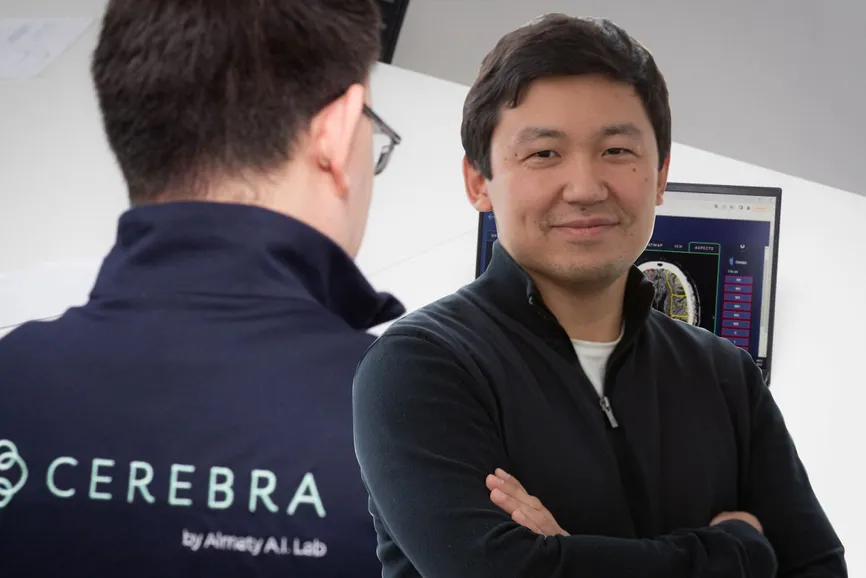Tech startups are always welcome in Kazakhstan - but with a tiny disclaimer. Though there’s a plethora of opportunities for young companies to grow, not many Kazakh startups that succeed in the early stages know what to do next. And even fewer companies that ‘made it’ are ready to share their scuffs and bruises with the media. CEREBRA is the exception.
The med-tech startup is the new and upcoming superseed that has attracted over $1.3 million and is already expanding to foreign markets. They developed an AI solution that helps doctors accurately diagnose any type of stroke in less than 10 minutes. Twenty-six hospitals in Kazakhstan already use it.
Doszhan Zhussupov, the CEO of CEREBRA, shared with QazMonitor six insights that every emerging startup in Kazakhstan must know. Read his guide to know how to move your company forward at any stage.
1. Know your money and make a pivot if necessary
We started as an artificial intelligence lab. We launched three research teams: pulmonology, ophthalmology, and neurology. Then, we had to make a choice since our resources were running out. According to the results of each team's work, we decided that the other two areas - pulmonology and eye diseases - we simply could not afford. And we saw the greatest market response, in terms of expectation not product, was neurology.
2. Med-tech is a gold mine for startups in Kazakhstan
There is no local competition in Kazakhstan. The main rivals are companies from the US and Israel, but Kazakhstan does not use their services yet. Those companies have distributors who try to upsell the services in the medical equipment tender contracts, but the hospitals do not use them.
CEREBRA currently works with 26 hospitals, with Aktau being the latest to sign the deal.
3. Listen to customer feedback, as conflicting as it may be
Our clients are doctors, and those who were originally open to tech and innovations became our most active users, providing the most feedback. It can be really specific.
Some doctors don't want a certain feature in the app while others do. For example, there are two types of strokes, and this is reflected in two software modules. Some doctors want to see only the ‘signalized’ type of stroke and not the other module (to eliminate distractions). Others ask for both tabs to be active for more information.
When your product is based on artificial intelligence, it must always learn - like a child. It has to be trained all the time. In CEREBRA, we are constantly refining and improving the product based on feedback.
4. Kazakhstan will have smart money for mature startups sooner than you think
For every risk, there is a certain type of investor. As an example, for early investment stages, Kazakhstan has business angels, incubators, acceleration programs, and funds like Shanyraq, MOST Ventures.
CEREBRA, on the other hand, is approaching the A-round of raising capital, and Kazakhstan lacks the needed ‘smart money’ investors, with certain exceptions, like Timur Turlov.
However, things are soon to change. I have met with the owners of oil and gas, who have already passed on their businesses to the younger generation. And this generation clearly understands that oil and gas industry will live for a decade at most, and investments in tech and business diversification is needed. It is not a trend yet, but given how engaged the younger ‘oil’ generation is, there is a high chance that they will develop our market. It’s just a matter of time, and one breakthrough can trigger the whole market.
5. Adapt your strategy to the local markets
When we met with Sequoia Capital (one of the leaders in venture investments), they gave it to us straight: “we have the money but only for South-East Asia”. The problem here is that venture capital funds raise money just like startups do, and people work with limited funds to a certain region.
So, we are going to register CEREBRA in Singapore, structure our future rounds there, and maybe register some intellectual rights, too. Venture companies in Singapore focus on investing in companies based in Singapore, and they have sufficient funds.
Once again, it’s a matter of time. When Kazakhstan has the right case and develops our own unicorn, all the major funds and players will come to our region.
6. Look at big players to predict the future of the industry
In our case, the future of medicine is in cloud. Cloud-based technology will accumulate different solutions, including for medical services.
For example, imagine some hospital in Pavlodar having an MRI connected to a cloud with service from Amazon, Google, or Alibaba. The machine is the most powerful and multifunctional diagnostic device in the world; it can detect a very large number of diseases that no professional from a smaller town can detect. And it's already happening now: Google created the Google Health project, and Amazon and Alibaba are working on their projects too.
We are heading toward that future. The CEREBRA’s strategy is to contribute to this structure of new medicine. We are sure that our specialization and dedication to diagnosing strokes will get us there.
